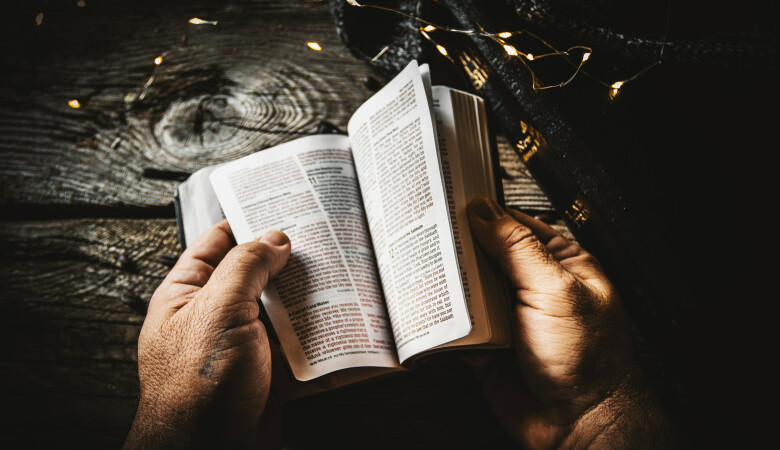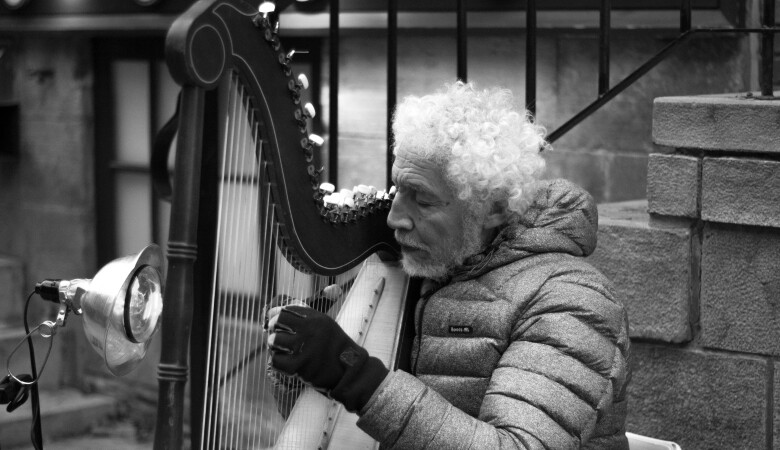Our Inviting King (Matthew Sermon 48 of 151)
March 02, 2003 | Andy Davis
Matthew 11:28-30
Calling, The Power of Sin
Pastor Andy Davis preaches an expository sermon on Matthew 11:28-30. The main subject of the sermon is how Christ graciously invites us to His kingdom.
- SERMON TRANSCRIPT -
I. The Bondage of Sin
Turn in your Bibles to Matthew 11:28-30. I have an incredible sense of anticipation and delight in taking on these verses. I'm so excited to be able to proclaim to you the invitation that Jesus gave when he said, "Come to me all you who are weary and burdened, I will give you rest,” because I've found in this world that there is no rest like that which Jesus gives. It seems to me that rest is the one thing that Satan cannot counterfeit. It's a gift of God through Jesus Christ. He's offering it to all of us freely, without money or cost. He's offering it to any who will come and take it from him.
As I look around the world today, I'm thinking much about the tyranny and bondage that fills this world. I don't mean the tyranny and bondage of bad human government, such as that of Saddam Hussein in Iraq, although that's grievous enough. I'm thinking of the wide-reaching effects of a far greater tyranny and bondage, and that is the bondage of sin and the devastation that comes to our lives through our own sin and through the effects of the sins of other people to us. I think that that sums it all up, doesn't it? When you look at the grief in your life, all of it has come through sin. Either your sins directly and the effects of your own sin or the sins of other people, whether you knew them or not. It's a terrible bondage. We see the effects of it, too, physically in the world, don't we? We know that somewhere in the world, this morning, a drug addict is waking up and feeling the effects of last night's excesses and resolving in his heart never to do it again, and later today he'll begin again to seek to meet that craving because he's in bondage. We know that somewhere in the world today, a wife is crying her eyes out because last night, she found out that her husband has been unfaithful to her, or a husband is struggling with things like internet pornography or other forms of immorality, and he feels a bondage and he cannot break it. There's a tyranny to it, but he has no answer. We know that somewhere in this country today, a baby will be aborted because her mother sees no way out of the hopeless situation, no sense of hope, just a sense of desperation,or an old woman will lie crying in bed because her children have forgotten her through their selfishness and their busyness. They won't come to see her and won't get active in her life.
We know that somewhere in this hemisphere, perhaps in Haiti, there are orphan children that are climbing around on dump piles looking for enough food to survive, and some of them will die from the diseases that they catch there. All of this has come through the tyranny and the bondage which is sin. It's an amazing thing that Jesus stands in the midst of all of this as sin makes its powerful, boastful call over our lives saying,”I am the God of this world and there's nothing you can do to break my tyranny." A greater and stronger voice says, "Come to me all you who are weary and burdened, and I will give you rest. Take my yoke upon you and learn from me, for I am gentle and humble at heart and you will find rest for your souls, for my yoke is easy and my burden is light." What an astounding thing this is.
II. An Invitation to Sinners
We've been talking in the Gospel of Matthew about how Jesus is the King of the Kingdom of Heaven. But it's an incredibly unusual thing for a king who seeks to advance his empire to do so by standing before rebels and saying, "Please come back to me. Please come and bend your neck to my yoke and submit to my rule." Inviting rebels to submit? This is not the way it's usually done. When Alexander the Great wanted to take over the world, he got his army together and he got on his horse and he crossed the Dardanelles and he took on the Persians. When Julius Caesar wanted to turn the Roman Republican into an empire with himself as emperor, he crossed the Rubicon with his legions and marched on Rome. When Genghis Khan wanted to take over the greatest empire and land mass that the world has ever seen, he got together the greatest cavalry the world had ever seen. These Mongols were able to shoot at a tiny, little ring with an arrow at full gallop backwards, and conquer China. That's what you do if you want a larger kingdom. You don't do this: You don't stand humbly and quietly and spread out your arms before Chorazin and Bethsaida and Capernaum who have rejected you and say, "Come to me all you who are weary and burdened, and I will give you rest." That's not the way it's done. But it is the way it's done in the Kingdom of Heaven.
We see the lion of the tribe of Judah, who is fit and worthy to take the title deed for the earth. No one else is worthy, not Alexander the Great or Julius Caesar or Genghis Khan or Napoleon or any of these other great world leaders and conquerors, none of them worthy to take that scroll. But this one is, the lion of the tribe of Judah. He is sovereign and he is powerful. He says, "All things have been committed to me by my father." He's a sovereign king, he is a lion. He rules. And when he roars, the nations will tremble. But then John says, "I saw one looking like a lamb who is slain and he took that scroll." And so, this lion, the lion of the tribe of Judah, advances as a lamb, gentle and humble in heart, offering rest for souls of people who have been rebelling against him. This is an astounding thing.
Have you entered into his rest? Have you come to Christ? Have you found him to be rest for your souls? If not, come today. Today is the day of salvation. Even if you have already come to Christ, come again and again and again. Some people think, "This is an Evangelical Baptist Church, so we're going to have people walking the aisles at the end and invitation all that, and I don't need to do that because I did that before." So you've come to Christ, and then that's it, right? Oh, no, come to Christ again, and come to him again and come to him again and again. For Jesus said to the woman at the well, "Anyone who drinks of the water that I give him will never thirst, but the water that I give him will become in him a spring of water, welling up again and again to eternal life." So as often as you're thirsty, you come to Jesus and drink. This invitation is for you, if you are a weary and burdened sinner. If you're a weary and burdened sinner, Christ is reaching out to you and inviting you to come.
I'm going to take this text and divide into three parts. We're going to look at one of those three parts today. We're going to look at whom the king invites. Later we're going to look at what the king commands and what the king promises. But I'm so excited to tell you what the king commands and what the king promises, I'll do that again also today.
III. Who Does the King Invite—Weary, burdened Sinners
Whom does the king invite? He invites weary, burdened sinners like you and me. And what does the king command? Bow your neck to him. Submit to his yolk. Put his yoke upon you, stop fighting against his sovereign rule. Let Him be your king. Let Him be your Lord, learn from him, and let him run your life. That's what he commands. Well, what does he offer? What does he promise? Rest for your souls, rest now, and rest for ever more. Rest in this world, the peace of God, a sense of peacefulness in your soul; that it is well with your soul. And what value could be placed on that? You can't buy it. It's of incredible value, but how much greater peace with God, positionally, that God is no longer at war with you and that your sins are forgiven through faith in Christ, and that when you die, you'll be welcomed into heaven by God himself.
So whom does the king invite? He invites weary, burdened sinners. And what does he command? Submit to him, put your neck in his yoke. And what does he promise? Rest for your souls. Let's look at the first, whom the king invites. First of all, I want you to realize that the king is God. He's God the Father, God the Son, and God the Holy Spirit. Therefore, God the Father invites, and God the Son invites, and God the Holy Spirit invites. In the Old Testament, in the Book of Isaiah, God the father invited rebellious Israelites to come to him. He said, "Come now. Let us reason together. Though your sins are like scarlet, they shall be as snow. Though they are red as crimson, they shall be like wool. If you are willing and obedient, you'll eat the best from the land. But if you resist and rebel, you'll be devoured by the sword, for the mouth of the Lord has spoken." Is that not the same invitation? "Come close to me, and you'll find forgiveness." It’s an invitation to forgiveness.
"So whom does the king invite? He invites weary, burdened sinners. And what does he command? Submit to him, put your neck in his yoke. And what does he promise? Rest for your souls."
Later in Isaiah, he makes an invitation to feasting. In Isaiah 55:1-3, he says, "Come all you who are thirsty, come to the waters. And you who have no money, come buy and eat, come buy wine and milk without money and without cost. Why spend money in what is not bread in your life on what does not satisfy? Listen, listen to me, and eat what is good, and your soul will delight in the richest of fare. Give ear and come to me, hear me, that your soul may live." That is an invitation from God the Father to the Israelites and through them to us, to come very close for feasting, to stop wasting your life on things that don't matter, that don't satisfy, and to come very close to him, to have a banquet with God Himself. We see that God the Father invites, he invites us to come. God the Son invites.
Jesus invited again and again and again, not just here in this wonderful text, but in many places. Speaking to his disciples in Matthew 4:18-19, walking beside the Sea of Galilee, he saw there Peter and John and James and Andrew, four disciples, and they were fishing. What did Jesus say to them as he walked by them? He said, "Come, follow me and I will make you fishers of men." Later in Matthew 9, when he sees Matthew the tax collector sitting at the tax booth, he walks by and he says, "Come, follow me." Jesus is an inviting God, an inviting Savior, saying, "Leave behind your old way of living and come follow me." He says the same thing in his parables. His parables have in them an invitation to come. There's the parable of the wedding banquet when the father sends out messengers, servants to those who are invited to the banquet. He says, "Then he sent some servants and said, 'Tell those who have been invited that I've prepared my dinner. My oxen and fattened cattle have been butchered and everything is ready. Come to the wedding banquet.'" In the middle of his parables there's an invitation, "Come to the banquet." Speaking to hungry and thirsty and desperate souls in John chapter 7, on the last and greatest day of the feast, Jesus stood and cried out in a loud voice, "If anyone is thirsty, let him come to me and drink." He also speaks to dead people. He speaks to Lazarus in the tomb, and what does He say? After the stone is removed, he speaks to Lazarus and he says, "Come forth," and he comes. You see, Jesus is an inviting God.
Let me stop for a moment. I've struggled with this thing, and maybe you can help me. Is this an invitation or is it a command? Well, what's the difference? I've thought a lot about this, and I can't resolve it. Who is it that's saying "Come"? Is he giving us an invitation, or is he giving us a command? Let's say the difference is a command is something negative that's hard and burdensome and so we have to kind of do it. Is that the truth? Are not all of God's commands delightful? It's sin that's burdensome. What about an invitation? You say, "Well, an invitation is something that if you don't take up on, at least there's no penalty. It's a good thing that you're invited." Is that true? If you don't take Christ up on this invitation, do you realize what kind of penalty there is? Eternal hell. So is this not both an invitation and a command? I can't work it out. The fact of the matter is it's the king, and he's inviting you to come into his presence and feast and be with him. He gives us an invitation, just like he gave Lazarus an invitation to come out of the tomb, "Come out of that tomb, Lazarus." Aren't you delighted that Lazarus took him up on his invitation and came out of the tomb? Aren't you glad they didn't have to send somebody in the tomb and go get him? while." He came out.
On judgment day, he'll give an invitation. He will say to faithful stewards, "Well done, good and faithful steward. You've been faithful with a few things. I will put you in charge of many things." What's the next? "Come, enter into the joy of your master." There's an invitation. In the instance of the sheep and the goats, the King will say to those in his right, "Come, you, who are blessed by my Father. Take your inheritance, the kingdom prepared for you since the creation of the world."
Our God is an inviting God. God the Father says, "Come." God the Son says, "Come." God the Holy Spirit says, "Come." At the end of the Bible, in the Book of Revelation, Revelation 22:17. The Spirit and the bride say, "Come. And let him who hears say, 'Come.' Whoever is thirsty, let him come. And whoever wishes, let him take the free gift of the water of life." Around the world today, the Father, the Son, and the Spirit are inviting burdened sinners to come very close, to come close for salvation. This is a mysterious context, is it not? Think about the context of Matthew 11:20-30. Jesus is dealing with people responding to his ministry, to his miracles, really, and he condemns the cities in which most of his miracles had been performed because they didn't repent. "Woe to you, Chorazin. Woe to you, Bethsaida," he says. "Woe to you, Capernaum, because you didn't repent." There wasn't any organized, it seems, opposition to him in those cities; they just were indifferent. They didn't care. They didn't want to change their lives. They did not repent. Jesus denounced these cities. And yet, he's standing there holding out salvation to any who will come. Isn't that incredible? Right in the face of opposition, right in the face of indifference, he's standing there saying, "Come to me all you who are weary and burdened, and I will give you rest.”
Also, it's in the context of him proclaiming, preaching divine sovereignty; that He's sovereign over all things. He's sovereign in that he prays to his Father, and his Father is Lord of heaven and earth, and his Father conceals things from the wise and learned, reveals them to little children, because it was his good pleasure. This is our Sovereign God. He says, "All things have been committed to me by my Father. I rule over all things, heaven and earth. They've been given to me. I'm sovereign over things. Sovereign over salvation and over the events of life." The sovereignty of God clearly portrayed and proclaimed here. He says, for example, "No one knows the Son except the Father, and no one knows the Father except the Son, and those to whom the Son chooses to reveal him. Come to me all you are weary and burdened." There's no seam, no division, no chapter subtitle put in there. It just flows right from verse 27 to verse 28: Divine sovereignty and human responsibility, and an appeal to the sinner to come.
One of my favorite preachers was the Calvinist Charles Spurgeon, who believed in the sovereignty of God and was one of the greatest evangelists in history. He preached 11 sermons on Matthew 11:28-30. Charles Spurgeon never tired of this text. He loved to preach it, because he saw the sovereignty of God flowing out into a general and free invitation. Now, you say, "Wait a minute. This doesn't make sense. How can it be? How can God be sovereign? How can there be predestination? How can there be election and still a free Gospel appeal?" I'm going to tell you, in the end, I don't really know. My own intellect, my own wisdom is limited. But there doesn't seem to be any problem for Jesus, does there? He proclaimed sovereignty in verse 27, and gives a free Gospel invitation in verse 28. He's not troubled by this at all, but does it very clearly.
Now, I've already quoted Revelation 22:17, it says, "Whosoever will, let him take the water of life freely." Christ sees no conflict to this; he just says, "Whosoever will, come to me and find rest for your souls." It's not a burden at all. But other scriptures teaches that no one, absolutely no one, will respond to this invitation if the Father doesn't draw them first. "No one can come to me," said Jesus, "unless the Father who sent me draws him, and I will raise him up at the last day." John Murray said, "It is a moral and spiritual impossibility for sinners to come to Christ if God the Father doesn't draw him." And yet, God does draw sinners to Christ. Jesus says, "All that the Father gives me will come to me, and whoever comes to me, I will never drive away."
How does that happen? Well, it happens in the moment of preaching. When someone stands up, like me, and says, "Jesus is saying to you, 'Whosoever will, let him come.'" The appeal goes out to the ends of the earth. The message of faith is proclaimed, the gospel is proclaimed. And that message of faith that we are proclaiming, that if you confess with your mouth, "Jesus is Lord," and believe in your hearts that God raised Him from the dead, you will be saved. Faith comes by hearing the proclaimed message. So at the moment of a proclamation like this, faith springs up in the heart and people come. They come to faith in Christ.
Reminds me, this is an illustration that I thought of on 9/11/2001. There were firemen the next day going over the rubble, and they were calling out, calling down into the rubble. Who were they calling for? They were calling for live people. It stands to reason, doesn't it? “If anybody can hear me, make a sound and we'll get you out." There's a general call going out, and who's going to respond? Those that are alive. So it is with the gospel mysteries. The Father's work goes out and regeneration occurs. Then for the first time, you hear the gospel. Oh, you'd heard it lots of times before, but for the first time you hear it as Christ and he's standing and inviting, and he's saying, "whosoever will" means me. I should come. The Gospel appeal goes out.
Now, who is invited? According to this text, you who are weary and heavy laden. He says, "Come to me, all you who are weary and heavy laden, and I will give you rest. Come, ye sinners, poor and needy, weak and wounded, sick and sore." Jesus, ready stands to save you, full of pity, love, and power. That's who he's appealing to: Weary and heavy laden. The Greek literally says, "Those who labor, those who are burdened, those who are under a crushing burden and they feel the weight of it." I think of the slaves in Egypt, when Pharaoh took away their provision of grass, and they had to go out and cut their own grass and their quota of bricks was not decreased at all, and they felt the task masters lash on their backs. This is a metaphor for the burden of sin, a slavery to sin.
Some people think that this burden refers to those that are crushed by the demands of the Mosaic Law, or crushed by the burdens of the law. The Ten Commandments, we break them every day. We feel it. Some people think it's the burden of religiosity, trying to work out your salvation apart from Christ, trying to be a good person, trying to do it through religion, trying to give a little more money, or do a few more good deeds, pray a little longer, fast a little bit. Like Martin Luther, in the middle of his cell as a monk, laying on the stone floor with his blanket up in his cot. He wouldn't put the blanket on him because he thought his own physical suffering would make him more attractive to God, and that God would forgive his sin. But the problem that Luther found is no matter how much he tried to do enough for God, there was never an enough. It didn't matter how much you did in your religiosity. It was never enough, because God is holy and perfect. So then we have the weary, burdensome sense of religion crushing us at that moment. Scribes and Pharisees, Jesus said, "They tie up heavy burdens and put them on men's shoulders, but they don't lift a finger to move them." The Pharisees set up a religious system that nobody could survive. In Acts 15:10, it says, "Why do you try to test God by putting on the necks of the disciples a yoke that neither we nor our fathers have been able to bear?" The crushing burden of religiosity, trying to earn your salvation through good deeds. Galatians 5:1 says, "It is for freedom that Christ has set us free, stand firm then, and do not let yourselves be burdened again by a yoke of slavery."
This is religiosity, a sense that I'm going to try to save myself by being good person. I'm never going to do that stuff again. I'm going to start doing all kinds of good things. Well, how's it going? Do you find yourself pulled again and again to that stuff, the very things you've repudiated? Do you find yourself unable to live up to the perfect standards you know are in the Bible? It's a crushing burden, isn't it? The burden of trying to earn your own salvation. You never will, because God's standards are perfect. But you know, I don't think these are the burdens. I think the real burden is sin; it's not the law of God. Frankly, God's commands are not burdensome. It's sin that's a burden. Sin is a devastating, vicious tyrant and task master.
In C.S. Lewis’s Screwtape Letters, the older uncle Screwtape talking to the younger demon Wormwood, giving him advice on how to tempt us, said, he's dealing with the topic of pleasure, say, "You need to be careful with pleasure, because pleasure really belongs to the enemy.” That's God, by the way. "Pleasure is the enemy's. We don't get into pleasure, but we have to use pleasure to entice people into sin. But we've got to wean them off it as quickly as possible. Here's the recipe for success. Ever-increasing bondage to the sin with ever-decreasing pleasure in it. That's a winning combination." You go ask the addict, "How much pleasure do you get out of your addiction?" They'd give anything to trade it if they could. But they're stuck, and so they're in bondage. So it is for all of us, in bondage to sin apart from Christ. Along with that comes the crushing burden of a sense of impending judgment from God, the burden of a guilty conscience. Job said in 31:4, "Does he not see my ways and count my every step?" Does He not see my ways and count my every step? Jesus said, "Men will have to give an account on the Day of Judgment for every careless word that they have spoken." That leads to a burdened conscience.
In Lamentations 1:14, it says, "My sins have been bound into a yoke, by his hands, they were woven together. They've come upon my neck, and the Lord has sapped my strength. He's handed me over to those I cannot withstand." Sin becomes the crushing yoke on our neck. We can't survive the crushing burden of a guilty conscience. Edgar Allan Poe in his grim story, “Tell-Tale Heart”, speaks of a man, probably insane, who killed another man and hid his body in his house. In the middle of the night, the policeman comes and knocks on the door, because the neighbor had heard a single cry. He lets this policeman in, so proud of himself that he has thoroughly disposed of the body and any evidence of the crime. He's thoroughly convinced that he's going to be able to nonchalance his way through this interview with the policeman. But as he's sitting there, he starts to hear the pounding of a heart in his ears. He's uncomfortable, because he knows what it is. It's the beating heart of the man that he's murdered. He's afraid that the policeman will be able to hear it. And eventually, under the pressure and the weight of a guilty conscience, he confesses his crime. The policemen hasn't heard a thing. So also Christian in Pilgrim's Progress feels the burden on his back of guilt from sin, and it does not come off until he comes to the cross and it rolls off into the empty tomb.
But what are we going to do to free ourselves from guilt? There's only one thing: "Come to me, all you who are weary and burdened, and I will take that burden off you. I will die in our place under the wrath of God. I will take all of your sins on myself and I will extinguish the wrath and curse of God for you. If you only come to me, I will take away your burden." So whom does the king invite? He invites sinners, weary and burdened sinners, and invites them to come to him. He doesn't say, "Come to a program. Come to a religion." He says, "Come to me." Come to a person. So it's not to what does the king invite weary burdened sinners; it's to whom. He invites us to come to himself. To a personal, intimate relationship with Jesus Christ. "Come to me and I will give you rest." You look to him and he can and will free you from your burden of sin. He commands that you bend your neck to his yoke. You can't come to Christ the Savior and not have him as your Lord. But Jesus comes to free you from the guilt and the burden of sin. Ultimately, He promises you a rest that only he can give.
IV. Application
What application can we take from this? First of all, I want you to marvel at the grace of Christ our King. We don't deserve this, do we? We do not deserve a king to stand in front of us like this, gentle and humble in heart, and welcome us back to himself. And he doesn't do it just once, does he? He does it again and again and again. As often as we need, he invites us very close to come.
Secondly, I want you to feel the burden of sin and hate it. I want you to hate sin as much as Jesus does. I want you to realize that all the grief you have in your life comes from your sin and from the sins of others to you. Therefore, I want you to feel the weight, the burden, the heaviness of sin so that you will despise it. Well, what then? Then you come to Christ. I'm appealing to any who have never come to faith in Christ that you would come today and trust in him. Do you think that you can stand before him without his forgiveness, without the blood of Christ, and survive Judgment Day? You cannot. So come to Christ today. Don't leave this room without coming to Christ. If today, you hear him calling to you, come to him and let him save you from sin.
"All the grief you have in your life comes from your sin and from the sins of others to you."
But if you've already committed your life to Christ, do you think this text has nothing to say to you? Suppose you're wrestling with immorality. Suppose you're wrestling as a spouse with relational problems, bickering and arguing, and selfishness. Suppose every time a trial comes in your life, you respond with frustration and irritation rather than faith. "Come to me," said Jesus, "and I'll free you from that. Come to me and I'll free you from immorality. I'll free you from internet pornography. I'll free you from abortion. I'll free you from spousal abuse. I'll free you from alcohol abuse. I'll free you from prayerlessness. I'll free you from laziness. I'll free you from unbelief. I'll free you from disrespect for authority. I'll free you from sin. Come to me." If today, you hear his voice, don't harden your heart. That's good for every day, day after day. Come to Christ.































